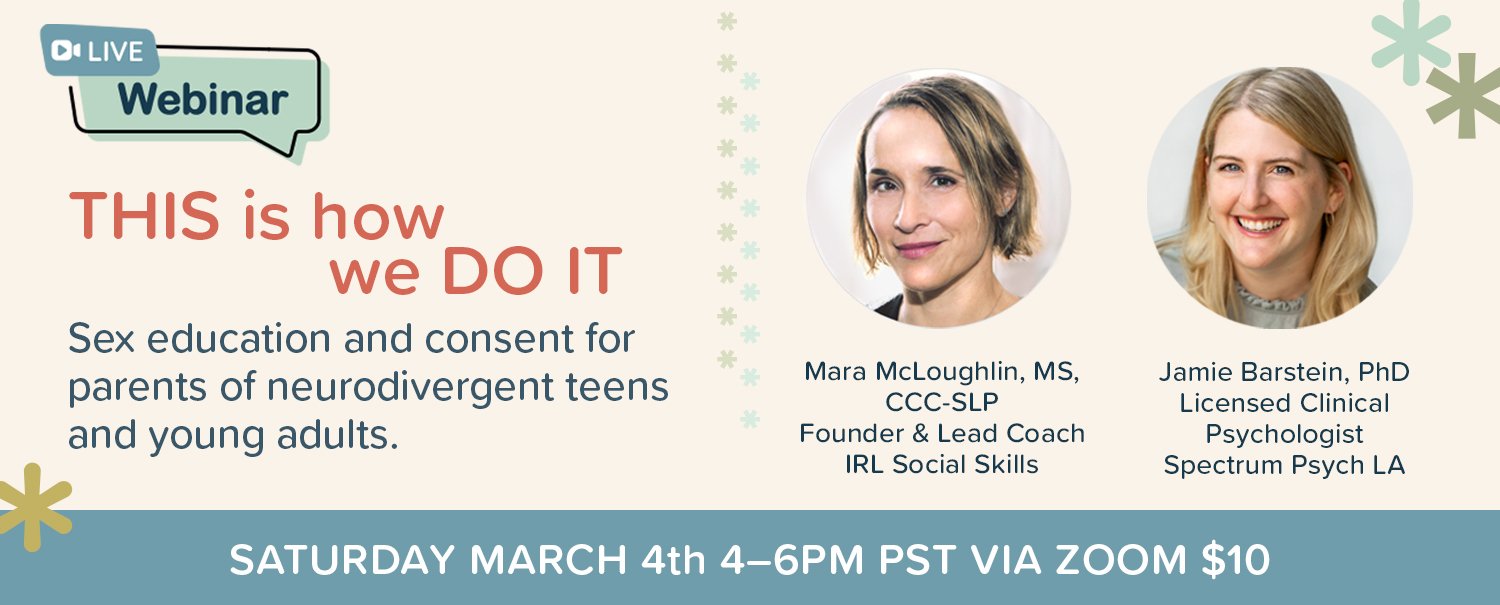SEX EDUCATION
FOR PARENTS OF AUTISTIC, ADHD AND NEURODIVERGENT YOUTH
Going over the “birds and bees” is a necessary part of parenting. It can be hard to know how to support your child as they navigate the complexities of dating, romance and sexual intimacy. School sex-ed courses are well-intentioned but often miss the mark or leave too much unsaid. And few are inclusive, gender- and neurodiversity-affirming in their approach.
Our webinar makes it easy to support your teen or young adult through the complexities of romantic and sexual relations.
Join us Saturday March 4th from 4–6pm PST for a special webinar featuring guest speaker, Dr, Jamie Barstein.
Dr. Barstein is a licensed clinical psychologist with a specialization in the assessment and treatment of individuals with neurodevelopmental disabilities, such as autism spectrum disorder (ASD) and attention deficit hyperactivity disorder (ADHD). While trained as a child and adolescent psychologist, she is well-versed in working with individuals with neurodevelopmental disabilities across the lifespan.
Dr. Barstein leads sex education groups for adolescents and young adults with ASD and is passionate about developing effective sex education programming and supports for neurodivergent adults. She is an LGBTQIA+ affirming therapist who has developed a subspecialty working with autistic individuals who are exploring their sexual or gender identity.
LIVE SEX ED WEBINAR FOR PARENTS
SATURDAY, MARCH 4th
4–6PM PST
COST: $10
“Most autistic individuals have typical sexual and romantic feelings and desires. They have a right to sex education and to engage in sexual activities. Without proper education, autistic individuals may engage in socially inappropriate or dangerous ways of fulfilling their sexual and intimacy desires. Sex education is preventative and proactive.”
DR. JAMIE BARSTEIN, PhD, SPECTRUM PSYCH
NEURODIVERGENCE-AFFIRMING SEX EDUCATION
Because neurodivergent teens often lag behind their typically developing peers, they may need specific help setting appropriate boundaries and understanding consent. Difficulty understanding social cues and communication problems can lead to confusion, unnecessarily painful outcomes, and safety concerns.
Autistic and neurodivergent individuals are at greater risk of sexual assault and abuse. Sex education has been shown to help mitigate those risks, but most sex ed courses are geared toward neurotypical individuals. Neurodiversity-supporting sex education tackles the topic head-on for better health and safety outcomes, as well as romantic and intimate relationship success.
“Sex education as it's taught in the schools is ineffective for individuals on the spectrum. Myths abound, like autistic people don't have sex drives or that explicit and direct instruction in sex ed will cause problems. The fact is, autistic people experience all the same variety of sex drives that the neuromajority experiences, and the more matter-of-fact the instruction, the better.”
MARA McLOUGHLIN, MS, CCC-SLP
prepare your teen for a safe and healty sex life
If your autistic/neurodivergent child or teenager engages in problematic sexual behavior, it is most likely due to social, communication or sensory issues. Social skills coaching — particularly a model that uses a peer-learning approach — provides a learning environment where neurodivergent youth and/or adults can address these issues and safely practice their communication skills.

